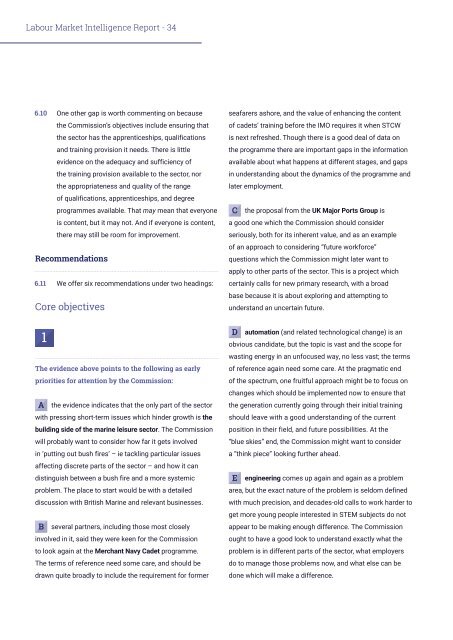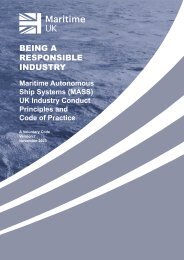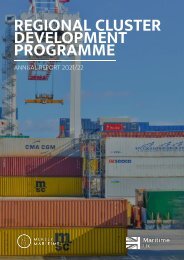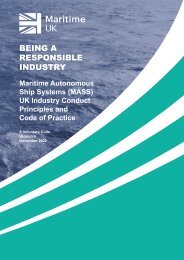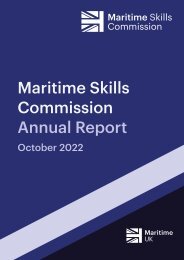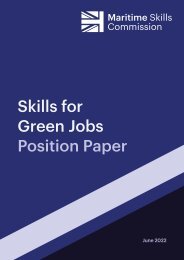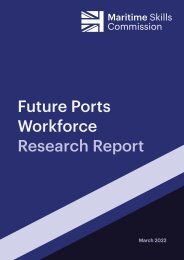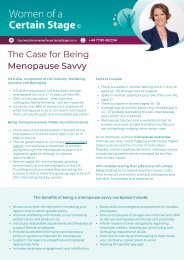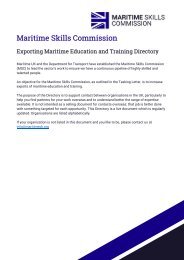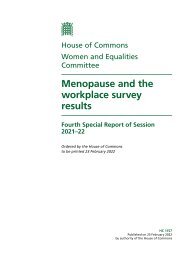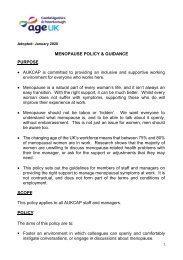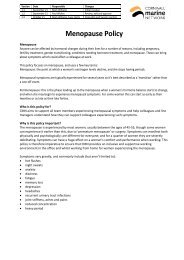Maritime Skills Commission - Labour Market Intelligence Scoping Report - August 2020
Create successful ePaper yourself
Turn your PDF publications into a flip-book with our unique Google optimized e-Paper software.
<strong>Labour</strong> <strong>Market</strong> <strong>Intelligence</strong> <strong>Report</strong> - 34<br />
6.10 One other gap is worth commenting on because<br />
the <strong>Commission</strong>’s objectives include ensuring that<br />
the sector has the apprenticeships, qualifications<br />
and training provision it needs. There is little<br />
evidence on the adequacy and sufficiency of<br />
the training provision available to the sector, nor<br />
the appropriateness and quality of the range<br />
of qualifications, apprenticeships, and degree<br />
programmes available. That may mean that everyone<br />
is content, but it may not. And if everyone is content,<br />
there may still be room for improvement.<br />
Recommendations<br />
6.11 We offer six recommendations under two headings:<br />
Core objectives<br />
seafarers ashore, and the value of enhancing the content<br />
of cadets’ training before the IMO requires it when STCW<br />
is next refreshed. Though there is a good deal of data on<br />
the programme there are important gaps in the information<br />
available about what happens at different stages, and gaps<br />
in understanding about the dynamics of the programme and<br />
later employment.<br />
C the proposal from the UK Major Ports Group is<br />
a good one which the <strong>Commission</strong> should consider<br />
seriously, both for its inherent value, and as an example<br />
of an approach to considering “future workforce”<br />
questions which the <strong>Commission</strong> might later want to<br />
apply to other parts of the sector. This is a project which<br />
certainly calls for new primary research, with a broad<br />
base because it is about exploring and attempting to<br />
understand an uncertain future.<br />
The evidence above points to the following as early<br />
priorities for attention by the <strong>Commission</strong>:<br />
A the evidence indicates that the only part of the sector<br />
with pressing short-term issues which hinder growth is the<br />
building side of the marine leisure sector. The <strong>Commission</strong><br />
will probably want to consider how far it gets involved<br />
in ‘putting out bush fires’ – ie tackling particular issues<br />
affecting discrete parts of the sector – and how it can<br />
distinguish between a bush fire and a more systemic<br />
problem. The place to start would be with a detailed<br />
discussion with British Marine and relevant businesses.<br />
B several partners, including those most closely<br />
involved in it, said they were keen for the <strong>Commission</strong><br />
to look again at the Merchant Navy Cadet programme.<br />
The terms of reference need some care, and should be<br />
drawn quite broadly to include the requirement for former<br />
D automation (and related technological change) is an<br />
obvious candidate, but the topic is vast and the scope for<br />
wasting energy in an unfocused way, no less vast; the terms<br />
of reference again need some care. At the pragmatic end<br />
of the spectrum, one fruitful approach might be to focus on<br />
changes which should be implemented now to ensure that<br />
the generation currently going through their initial training<br />
should leave with a good understanding of the current<br />
position in their field, and future possibilities. At the<br />
“blue skies” end, the <strong>Commission</strong> might want to consider<br />
a “think piece” looking further ahead.<br />
E engineering comes up again and again as a problem<br />
area, but the exact nature of the problem is seldom defined<br />
with much precision, and decades-old calls to work harder to<br />
get more young people interested in STEM subjects do not<br />
appear to be making enough difference. The <strong>Commission</strong><br />
ought to have a good look to understand exactly what the<br />
problem is in different parts of the sector, what employers<br />
do to manage those problems now, and what else can be<br />
done which will make a difference.


